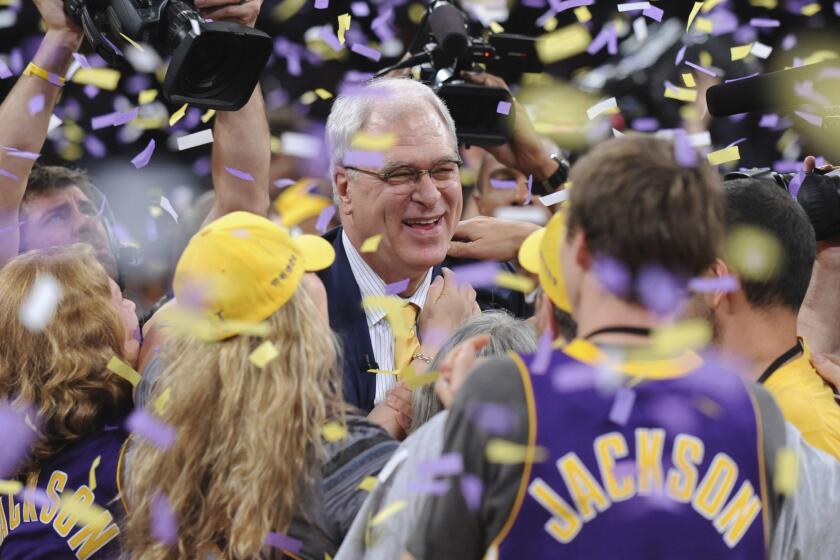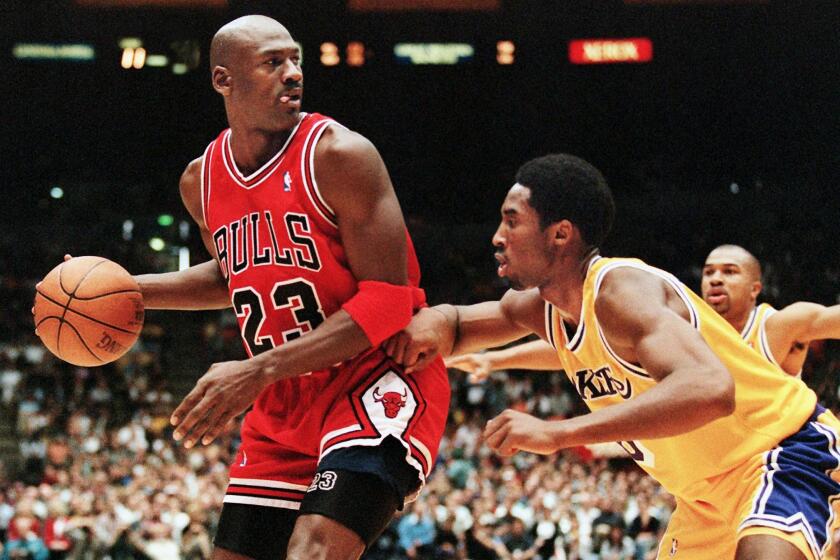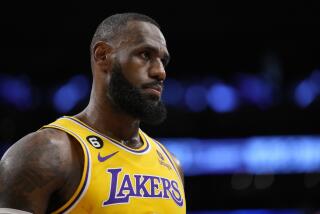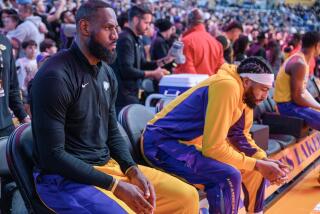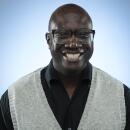Lakers know the difficulty of winning an NBA title: A look at 2010
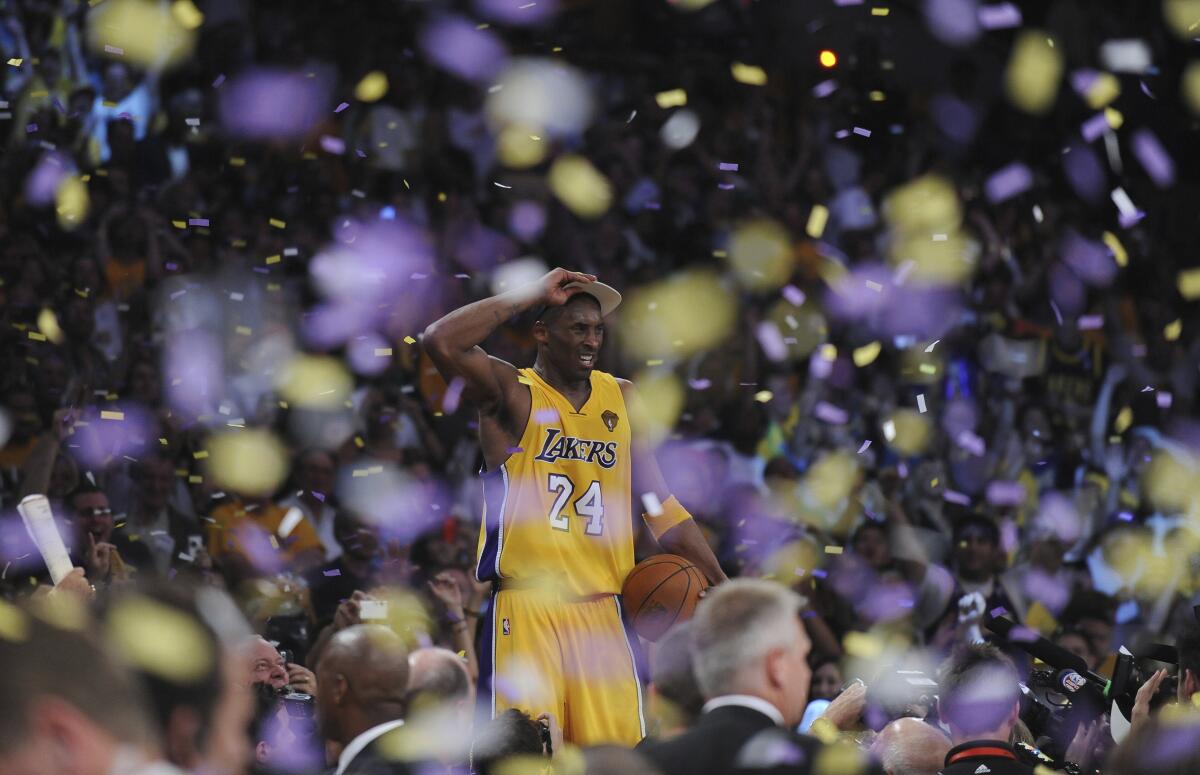
- Share via
First in a series about the 2009-10 Lakers, the last Lakers team to win an NBA title.
In 1985 when the Lakers finally beat the Boston Celtics in the NBA Finals after decades of futility, the greats who never could do it — men like Jerry West, Elgin Baylor, Gail Goodrich — thanked the players who did. After the 1980s, the rivalry went dormant for two decades before a new generation of Lakers were initiated in 2008.
When they got there, the new generation realized it wasn’t just about their moment. No, the weight of decades rested upon them, as did the weight of their own personal failures and victories. The Lakers lost to the Celtics in the 2008 Finals and it haunted them no less than 1959, ‘62, ‘63, ‘65, ‘66, ‘68, ’69 and ’84 had their generational predecessors.
Their redemption arrived on June 17, 2010, not a moment too soon.
“For two years we hadn’t been able to sleep basically,” Derek Fisher said.
It ended with Kobe Bryant standing on the Staples Center scorer’s table, wildly pumping his fist five times toward the crowd to celebrate his fifth championship.
Ten years ago the Lakers won the franchise’s 16th championship and 11th since moving to Los Angeles. They did it in the most dramatic, and satisfying, fashion possible — a seven-game series against the Celtics.
A series of articles on the Lakers’ 2009-10 season and how the team defeated the Boston Celtics in seven games during the NBA Finals that season.
This year’s team, led by LeBron James, had the same inspired start the 2009-10 team had, the same championship expectations. They had the best record in the Western Conference when the season was suspended March 11 because of the coronavirus. It’s unclear when the season will resume, or if a proper playoff schedule will be completed after this unprecedented hiatus.
The Lakers don’t have to look back too far to see an example of how difficult it is to win an NBA championship, how magical those runs can feel and how quickly an era can end.
Just 10 years.
::
Last month, former Lakers general manager Mitch Kupchak flipped on the television at the home in Charlotte, N.C., he shares with his son. Game 7 of the 2010 Finals was on — it was the second quarter and he thought about shutting it off to avoid the pain.
“Obviously with Kobe’s passing away, it makes looking at it tougher,” said the general manager of the Hornets.
But he kept watching. He’d forgotten how low scoring it was, how nobody could get a clean look at the basket.
Pau Gasol watched from Northern California, where he’s living with his wife’s family.
“I got emotional too, especially towards the end and hearing Kobe speak when he got the MVP trophy and how he acknowledged me,” Gasol said. “With him being gone, I got really emotional. It just really meant a lot to me. It’s one of those things with time that you learn to appreciate things and value things more, what you have gone through, what you have achieved, people you have had in your life, people you have shared special things with.”
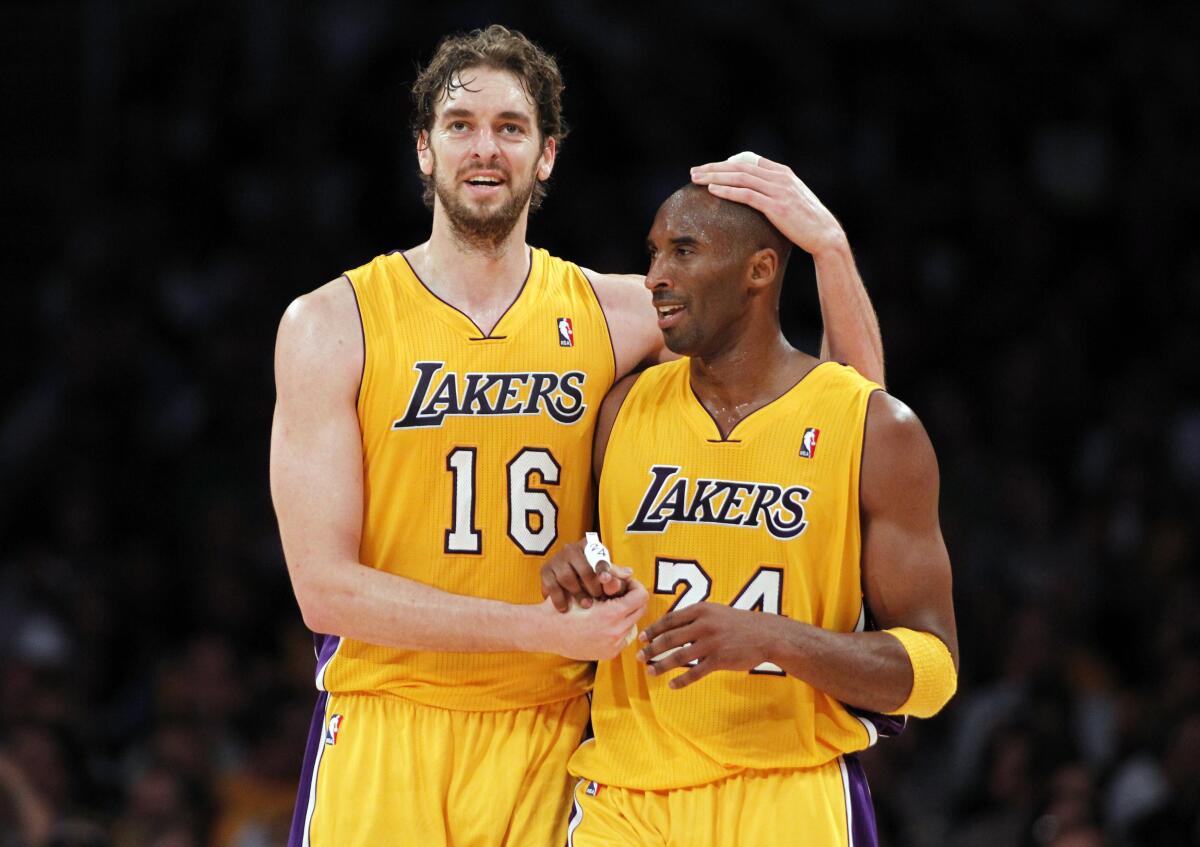
Kupchak acquired Gasol in a trade with the Memphis Grizzlies on Feb. 1, 2008.
The 7-footer’s arrival provided Bryant with the championship partner he’d longed for, ending an ugly period in his relationship with the team. In 2004, Kobe had considered signing with the Clippers as a free agent; only the previous summer he had demanded a trade.
A season that started with modest expectations suddenly became one in which the Lakers could see a championship in their future. They finished first in the Western Conference. They waltzed through the 2008 playoffs with little resistance until the Finals, where they faced the Celtics.
“We lost to them, everybody [was] crying in the Boston Garden,” Jordan Farmar said.
They promised each other it wouldn’t happen again.
That summer Gasol and Bryant played against each other in the Beijing Olympics in group play and the gold-medal game. The Americans won gold and Gasol’s Spanish national team had to settle for silver.
When the Lakers reconvened in the fall, Gasol found an unwelcome gift in his locker — Bryant’s gold medal.
Gasol recalled Bryant’s message: “Don’t allow yourself to lose again in this season. We got to win the championship. No more losing. You cannot allow yourself to lose.”
The Celtics didn’t make it back to the Finals the next season, but the Lakers did. They beat the Dwight Howard-led Orlando Magic in five games to win their first title of the post-Shaquille O’Neal/Kobe era.
“When we came back home, the whole team’s mind-set was already prepared for next year,” reserve center D.J. Mbenga said. “We won, but we were already talking about back-to-back” titles.
::
Metta World Peace, known then as Ron Artest before a name change in 2011, had been partying with friends at the SLS Hotel in Beverly Hills when he got the call from the Lakers just after midnight on July 1, 2009. He was delighted they were calling; this is what he wanted. After a quick negotiation period, he became Trevor Ariza’s replacement, to the chagrin of a city that loved Ariza.
Some saw him as an unpredictable presence that might threaten the Lakers’ chemistry, which never came to fruition. It helped that World Peace had a friend on the team in fellow Queens native Lamar Odom and a coach in Phil Jackson who had dealt with strong personalities. The locker room was strong too. But World Peace did make his presence felt.
During a meeting at the start of training camp, World Peace stood up to address the team. He told them he was happy to be there and that where he comes from things are handled a little bit rougher than they might be used to.
“Phil was like, ‘OK, thank you Ron for letting us know, but you can sit, thank you for letting us know,’” Mbenga recalled.
Michael Jordan ridiculed Kobe Bryant during the early part of the Lakers star’s budding career. Bryant, however, slowly earned Jordan’s respect.
World Peace was the only newcomer — and the only one without a title.
“One day in practice I just disrupted the whole practice because I didn’t want them to think, Metta’s on this team, he don’t got a ring, we got a ring, he just gotta come in with the ultimate respect,” said World Peace, whose Houston Rockets team lost to the Lakers in the 2009 playoffs. “It was still a lot of respect, but I had to — I just wanted to compete. I just got finished losing against these guys.”
He talked trash to Bryant and to Jackson, behaving as if he was an opponent, not a teammate. Eventually Jackson tried to defuse the situation.
“Ronny, that’s enough,” he said.
It didn’t immediately work.
In truth, he was delighted to be playing for Jackson, who had coached World Peace’s idol, Dennis Rodman. He knew he could help Bryant win a championship.
The Lakers won 18 of their first 21 games and their chemistry remained strong throughout the season. Andrew Bynum became a reliable starter. Fisher offered stability. They had a talented bench, that they’d need. Odom flourished off the bench, along with guards Shannon Brown, Sasha Vujacic and Farmar.
They never lost more than three games in a row and that happened only once — in March. The defending champions were showing they could do it again.
::
Winning a championship isn’t always pretty.
The Lakers won Game 1 at home, and then lost Game 2. Doubt crept in.
They won Game 3 but lost the next two in Boston, making Game 6 an elimination game, threatening a repeat disaster.
The Lakers won Game 6 and turned their attention toward the finale.
“Kobe told us, ‘You guys get ready, they’re gonna trap me but you guys be ready to make us win,’” Mbenga said. “Everybody was ready. The job Lamar did was unbelievable. Pau unbelievable. Drew [Bynum]? If people know what Drew was going through with his knee and that boy came back and play?”
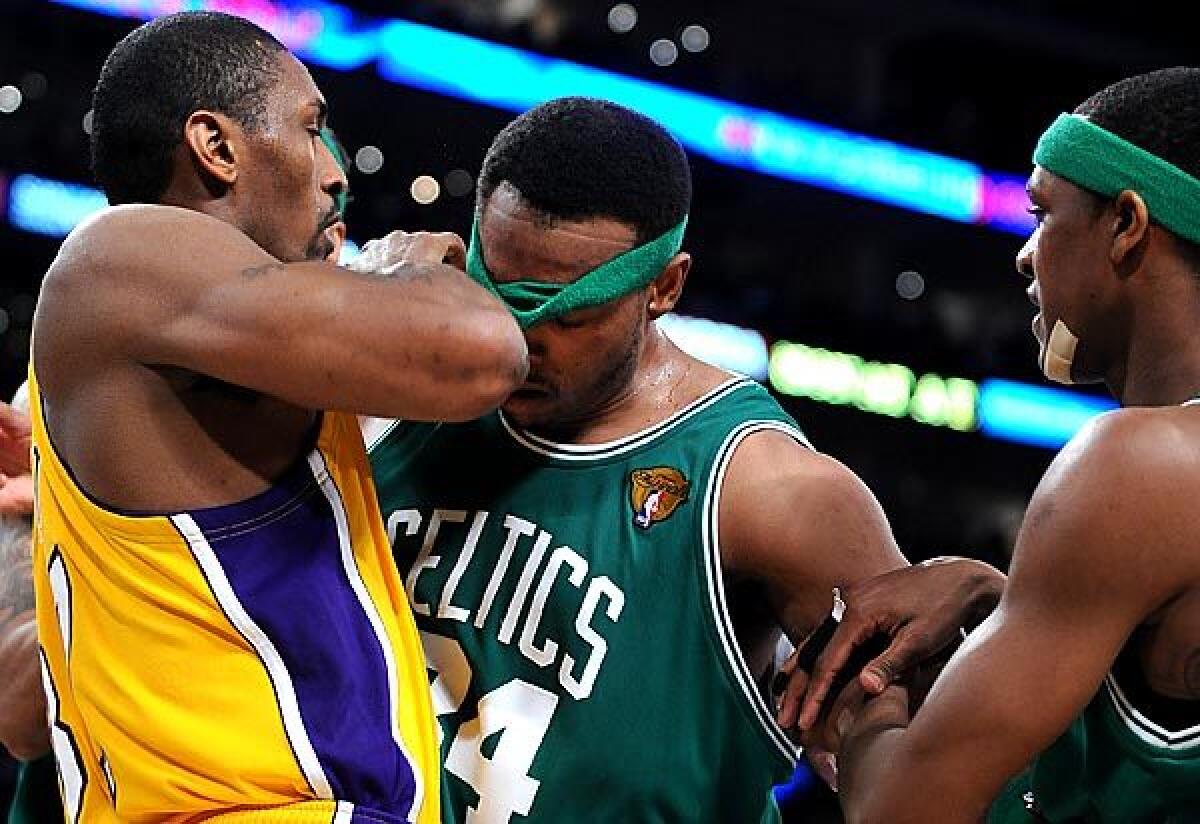
At halftime, the Celtics led 40-34.
“It was ugly as hell,” Farmar said. “It was a wrestling match. Both teams didn’t make no shots. We were just scraping, clawing, trying to fight.”
World Peace likes to think he had something to do with that.
Bryant shot six of 24 from the field in that game, but as he predicted his teammates filled the void. He did grab 15 rebounds.
“He was rebounding like he was 7 feet tall,” Kupchak said.
Late in the fourth quarter, Bryant passed the ball to World Peace, who sank a three-pointer with 1:01 left. They led by six, but the Lakers weren’t comfortable yet. Not until Vujacic made two free throws with 11.7 seconds left could they exhale on the way ton an 83-79 victory.
“Certain things in life that when you earn it and you know literally like nothing was handed to you, nothing was given to you, very little things happen on accident or by luck, like you literally have to drain yourself to do it,” Fisher said. “That’s what made that series so special.”
They’d celebrate with parties and a parade. They didn’t know if they were in the middle of an era, or the end.
Tomorrow: How the Lakers rebuilt the team following the three-peat era and the loss in 2004 NBA Finals.
More to Read
All things Lakers, all the time.
Get all the Lakers news you need in Dan Woike's weekly newsletter.
You may occasionally receive promotional content from the Los Angeles Times.
